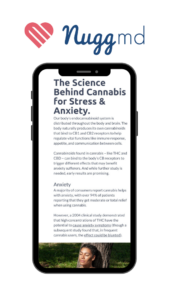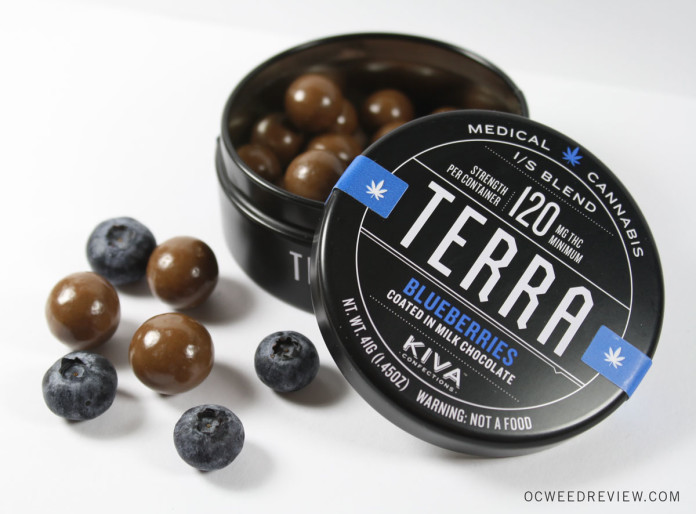Millions of individuals worldwide have chronic obstructive pulmonary disease (COPD). COPD includes several diseases, including chronic bronchitis and emphysema, that block airflow and cause breathing-related problems. With COPD, chronically inflamed lungs make it increasingly difficult for those afflicted to breathe as the disease advances.
COPD is a leading public health concern. According to the Centers for Disease Control and Prevention (CDC), nearly 16 million Americans have been diagnosed with COPD. In its early stages, 50% of people aren’t aware they have COPD until low lung function and shortness of breath limit daily activities. As of 2023, COPD ranks as the sixth leading cause of death worldwide.
Studies show CBD, short for cannabidiol, has many potential therapeutic properties, particularly its anti-inflammatory and antioxidant effects. Since COPD is an inflammatory disease, CBD's interaction with the endocannabinoid system may play a pivotal role in reducing inflammation and alleviating symptoms of the respiratory disease.
CBD may increase the activity of endocannabinoids, which are compounds naturally produced by the body to regulate various physiological processes. CBD may indirectly influence inflammation and oxidative stress by enhancing the body's natural antioxidants.1
CBD may have anti-inflammatory and antioxidant properties, but can you safely use CBD for COPD?

Find natural, lasting relief with our comprehensive (and completely free) patient’s guide to medical cannabis for stress and anxiety.
What is COPD?
Chronic obstructive pulmonary disease (COPD) is a complex respiratory condition that significantly impairs lung function and breathing. It’s a progressive disease that targets the lungs and airways, making it steadily harder for individuals to breathe as it advances. Currently, there is no cure.
The primary cause of COPD is long-term exposure to damaging lung irritants, with cigarette smoking as the most common risk factor for developing COPD. However, other environmental factors, such as exposure to air pollution, secondhand smoke, chemical fumes, and dust, can also play a role in the development of COPD. Genetic factors can influence an individual's susceptibility to the disease.
COPD symptoms come on gradually and are often overlooked. These common symptoms include a chronic and nagging cough, increased production of mucus, shortness of breath (especially during physical activities), wheezing, and chest tightness. As COPD progresses through its stages, these symptoms become more evident and pronounced. As these symptoms worsen, an individual's daily life can become significantly impacted, making even routine activities, like walking or taking care of yourself, challenging.
COPD diagnosis uses spirometry, a simple non-invasive test to see how well the lungs function. The treatment and management of COPD involves a comprehensive approach designed to alleviate symptoms, slow disease progression, and enhance lung function. Typical treatments for COPD include medication, lifestyle changes, and medical interventions.
Quitting cigarette smoking is critical and may be the most important step in COPD management. Another treatment is often prescription medications like bronchodilators and inhaled corticosteroids, which work to relax airway muscles and reduce inflammation in the lungs.
Therapies, like pulmonary rehabilitation, combine specialized exercises, breathing techniques, and self-care education to improve lung function and overall well-being. In cases where oxygen levels in the blood drop dangerously low, supplemental oxygen therapy may be required.
There are possible surgical interventions for individuals in advanced stages of the disease. These include lung volume reduction surgery or, in extreme cases, lung transplantation. Knowing the causes, symptoms, and conventional treatments, researchers see the potential of CBD in relieving COPD symptoms.
Benefits of Using CBD Gummies for COPD

The therapeutic potential of CBD, particularly in the form of easy-to-use gummies, may help manage COPD symptoms. CBD's anti-inflammatory properties can alleviate inflammation in the airways, a key aspect of COPD. Its antioxidant effects could reduce oxidative stress associated with lung damage in COPD patients. Additionally, the anxiolytic properties of CBD could ease the anxiety often experienced by COPD sufferers due to breathing difficulties.1
Multiple studies on CBD for COPD are ongoing. CBD has shown promise in regulating specific genes relevant to COPD. One study used a combination of CBD (cannabidiol) plus CBDA (cannabidiolic acid) with THC (tetrahydrocannabinol) plus THCA (tetrahydrocannabinolic acid) on cultured Human Small Airway Epithelial Cells (HSAEpC). These cells line the small pathways of the lungs.
They found the cannabis oil extract had the potential to balance the pro-inflammatory (Th1) and the anti-inflammatory (Th2) pathways, reducing overall inflammation. These treated cells also modulated 11 genes along a specific path that regulates inflammation and immune response. With these results, scientists are hopeful this could improve other symptoms of COPD.2 The positive results from this research open avenues for studying CBD’s benefits in other inflammation-related conditions.
The study by Atalay et al. also focused on CBD’s effect at the cellular level. Here, they found that the endocannabinoid system may also therapeutically control oxidative stress, which occurs when free radicals and antioxidants are out of balance. CBD acts through the PPARγ receptor to reduce inflammation and oxidative stress. It also enhances the activity of compounds like AEA and 2-AG, which are PPARγ initiators, further contributing to its anti-inflammatory effects. The modulation of the endocannabinoid system by CBD may indirectly affect inflammation, offering potential relief for COPD patients.1
While quitting smoking tobacco is a universal prescription for COPD patients that may slow the progression of the disease, does smoking cannabis lead to the same health risks? In a compelling study exploring the effects of cannabis smoking on COPD progression among middle-aged and older individuals, some unexpected insights emerged. Cannabis smoking — whether occasional or heavy use — did not seem to have a significant detrimental impact on the progression of the disease. This held true not only for those with established COPD but also for individuals without the condition at the beginning of the study.3
Other positive news came from a retrospective study examining the association of cannabis use with COPD hospitalizations. The study revealed that, among hospitalized COPD patients between 2005 and 2014, those who used cannabis had a much lower risk of in-hospital mortality and pneumonia compared to non-cannabis users. Although this study didn’t specifically focus on CBD, it highlights the potential positive impact of cannabis compounds, including CBD, on COPD outcomes.4

Find natural, lasting relief with our comprehensive (and completely free) patient’s guide to medical cannabis for stress and anxiety.
Risks of Using CBD for COPD
Smoking tobacco is a known factor in developing COPD. Although any form of smoking is discouraged for COPD patients, the role of cannabis in COPD is unclear. Cannabis smoking can exacerbate chronic bronchitis, but research does not show cannabis smoke as a cause of COPD.
While CBD holds the potential for easing some COPD symptoms, using CBD for COPD management isn't without its risks.
One risk is CBD’s potential for drug interactions. One study showed CBD conflicts with some drugs used for epilepsy and psychiatric disorders. CBD may interfere with how certain medications are metabolized, potentially resulting in altered drug effects or increased side effects.
Like many medicines, CBD is broken down and metabolized by the liver. Although rare, CBD may impact liver function and could lead to liver abnormalities. Doctors suggest medical oversight and monitoring of liver health when certain drugs are used in conjunction with CBD.
CBD can have other mild to moderate side effects, too. Gastrointestinal side effects can occur, including symptoms such as diarrhea, nausea, vomiting, and fatigue. Using CBD with other drugs, alcohol, or substances that cause drowsiness may increase the risk of sedation.5
Additionally, the accuracy of labeling in CBD products raises concerns. In an array of 84 different CBD product labels, only 30.95% accurately listed the correct amount of CBD. More than 42% had less CBD than the packaging indicated, and 31% had more.
Inaccurate labeling of CBD products not only misinforms consumers but also poses potential health risks, especially for those who rely on precise dosages for therapeutic purposes. The discrepancy between labeled and actual CBD content highlights the need for stricter regulations and quality control in the CBD market to ensure consumer safety and product reliability.6
Consumers can take precautions to minimize potential risks associated with using CBD for COPD. First and foremost, talk with your healthcare provider before incorporating CBD into your COPD management plan, especially if you are currently taking other medications. Your doctor will assess potential drug interactions and provide personalized guidance on CBD use.
When selecting CBD products, choose reputable manufacturers with a proven track record of quality and accurate labeling. Look for products that undergo third-party testing to ensure their content matches the label.
Take a cautious approach to dosing; begin with a low CBD dosage and gradually increase if needed. Using the minimal dose to achieve relief is both economical and can help mitigate potential side effects.
If you have pre-existing liver conditions or concerns about liver function, talk with your doctor about regular monitoring when using CBD. Be vigilant for any signs of liver abnormalities and promptly report them to your healthcare provider. Early warning signs can include yellowing of the eyes or skin (jaundice), abdominal pain, or swelling.
Additionally, pay close attention to any gastrointestinal side effects or adverse reactions while using CBD. If you experience discomfort, you can adjust the dosage or consult your doctor for guidance.
Many CBD products contain little or no THC. If you want to avoid any intoxicating effects, either skip products that include any THC or opt for a hemp-based product with less than 0.3% THC.
Lastly, keep your healthcare providers informed about your CBD use so they can factor it into your overall care plan and monitor for any potential issues.
What's the Best Way to Use CBD for COPD?

While CBD is a potential aid in managing COPD, smoke, including cannabis or CBD smoke, can be irritating to inflamed lungs and airways and further reduce lung health. Smoking CBD is not recommended. Fortunately, there are alternative options to still receive the benefits of CBD without smoking.
The body can absorb CBD and cannabis via the stomach and liver or through the blood vessel-rich mucous membranes in the mouth directly into the bloodstream. When it comes to CBD consumption for COPD, both of these methods are effective and minimize potential risks.
Oral Consumption
Edible products, such as gummies, chocolates, capsules, cookies, beverages, or baked goods, offer a safer alternative for COPD patients compared to smoking. These products are ingested and gradually release CBD into the bloodstream through the digestive system.
CBD gummies for COPD bypass the lungs, making edibles a safer way for people with respiratory problems to use cannabis. Edibles take a little time to kick in, often 30 minutes to an hour or more. This slow release delivers a big benefit in long-lasting symptom management.7
Sublingual Administration
Sublingual methods are often grouped with edibles, although they don’t initially follow a metabolizing path through the digestive system. CBD tinctures, oil drops, tablets, or dissolving strips placed under the tongue rapidly enter the bloodstream. Effects can begin within minutes.
Since sublingual methods employ a dropper or a measured dose, it’s a preferred treatment method by many cannabis doctors. Patients get accurate dosing and rapid onset without inhaled smoke irritating the lungs.
Smoking
Smoking, whether it involves cannabis or CBD-rich hemp flower, is strongly discouraged for COPD patients. Smoking exposes the lungs to harmful toxins and irritants, exacerbates respiratory symptoms, and potentially contributes to the development or progression of COPD.
Even so, studies are not conclusive about the detrimental effects of cannabis smoke. In fact, cannabis smoke may reduce lung inflammation and inhibit viral replication in COVID-19.8 It also has a bronchodilation effect, improving short-term air flow. Research may not account for daily smokers, deeper inhalation of smoke, or long-term use since these studies are limited.9
While some studies suggest that occasional or non-cumulative cannabis smoking may not be a significant risk factor for COPD, erring on the side of caution by avoiding smoking is advisable to protect lung health.10
Vaporization
Vaporization is often considered a less harmful alternative to smoking, but it may still pose risks for COPD individuals. Vaporizing CBD oil or e-liquids can introduce irritants into the respiratory system. While it may be less harmful than smoking, health professionals prefer patients opt for non-inhalation methods.
Edibles, sublingual administration, and other non-inhalation methods are gentle on the lungs and preferred for COPD patients due to their lower risk. These options are more suitable than smoking and vaporization for COPD patients.
Tips for Buying CBD for COPD
Fortunately for COPD patients and anyone who prefers not to smoke CBD, edibles are lung-friendly and offer a broad range of products to choose from.
When purchasing CBD gummies, reputable sources include dispensaries where medical or recreational cannabis is legal, online CBD retailers, pharmacies, and natural health stores featuring products with detailed information and CoA (certificate of analysis) reports.
Check the CBD concentration and the presence of other cannabinoids, such as THC. For individuals with COPD, many choose higher CBD levels and minimal or no THC content to avoid any intoxicating effects.
Also, consider CBD flower that is rich in terpenes. These aromatic compounds found in the essential oils of cannabis plants may boost the therapeutic and mood-altering effects of the product.
For COPD and inflammation, pinene, borneol, limonene, and α-terpineol have shown benefits in animal models and human studies for conditions like asthma and pneumonia.11
If you prefer, making your own edibles is economical and fun. Cooking with cannabis in a home kitchen is simple. You can use strains and terpenes that complement your COPD management plan. By following recipes and using an edible dosage calculator, you can transform flower or CBD oil for COPD to create foods that match your taste preferences and dietary requirements.
CBD for COPD management may work with your healthcare professional’s recommendations. For commercially produced products, keep the cannabinoid profile, terpene content, and brand reputation in mind. While scientific evidence is evolving, patients report successes in using smoke-free CBD products to manage COPD symptoms.
References
- Atalay S, Jarocka-Karpowicz I, Skrzydlewska E. Antioxidative and Anti-Inflammatory Properties of Cannabidiol. Antioxidants. 2019;9(1):21. doi:https://doi.org/10.3390/antiox9010021 ↩︎
- Mamber SW, Gurel V, Lins J, Ferri F, Beseme S, McMichael J. Effects of cannabis oil extract on immune response gene expression in human small airway epithelial cells (HSAEpC): implications for chronic obstructive pulmonary disease (COPD). Journal of Cannabis Research. 2020;2(1). doi:https://doi.org/10.1186/s42238-019-0014-9 ↩︎
- Barjaktarevic I, Cooper CB, Shing T, et al. Impact of Marijuana Smoking on COPD Progression in a Cohort of Middle-Aged and Older Persons. Chronic Obstr Pulm Dis. 2023;10(3):234-247. doi:10.15326/jcopdf.2022.0378 ↩︎
- Gunasekaran K, Voruganti DC, Singh Rahi M, et al. Trends in Prevalence and Outcomes of Cannabis Use Among Chronic Obstructive Pulmonary Disease Hospitalizations: A Nationwide Population-Based Study 2005–2014. Cannabis and Cannabinoid Research. 2021;6(4). doi:https://doi.org/10.1089/can.2020.0133 ↩︎
- Huestis MA, Solimini R, Pichini S, Pacifici R, Carlier J, Busardò FP. Cannabidiol Adverse Effects and Toxicity. Current Neuropharmacology. 2019;17(10):974-989. doi.org/10.2174/1570159X17666190603171901 ↩︎
- Bonn-Miller MO, Loflin MJE, Thomas BF, Marcu JP, Hyke T, Vandrey R. Labeling Accuracy of Cannabidiol Extracts Sold Online. JAMA. 2017;318(17):1708-1709. doi.org/10.1001/jama.2017.11909 ↩︎
- MacCallum CA, Russo EB. Practical considerations in medical cannabis administration and dosing. European Journal of Internal Medicine. 2018;49(49):12-19. doi:https://doi.org/10.1016/j.ejim.2018.01.004 ↩︎
- Lehrer S, Rheinstein PH. Association of cannabis with chronic obstructive pulmonary disease and COVID‐19 infection. Chronic Diseases and Translational Medicine. 2022;8(3):238-241. doi:https://doi.org/10.1002/cdt3.38 ↩︎
- Gates P, Jaffe A, Copeland J. Cannabis smoking and respiratory health: Consideration of the literature. Respirology. 2014;19(5):655-662. doi:https://doi.org/10.1111/resp.12298 ↩︎
- Tashkin DP, Igor Barjaktarević. Marijuana Use as a Risk Factor for Chronic Obstructive Pulmonary Disease: Not There Yet. American Journal of Respiratory and Critical Care Medicine. 2023;208(4):501-502. doi:https://doi.org/10.1164/rccm.202303-0404le ↩︎
- Kim T, Song B, Cho KS, Lee IS. Therapeutic Potential of Volatile Terpenes and Terpenoids from Forests for Inflammatory Diseases. International Journal of Molecular Sciences. 2020;21(6):2187. doi:https://doi.org/10.3390/ijms21062187 ↩︎
The information in this article and any included images or charts are for educational purposes only. This information is neither a substitute for, nor does it replace, professional legal advice or medical advice, diagnosis, or treatment. If you have any concerns or questions about laws, regulations, or your health, you should always consult with an attorney, physician or other licensed professional.




